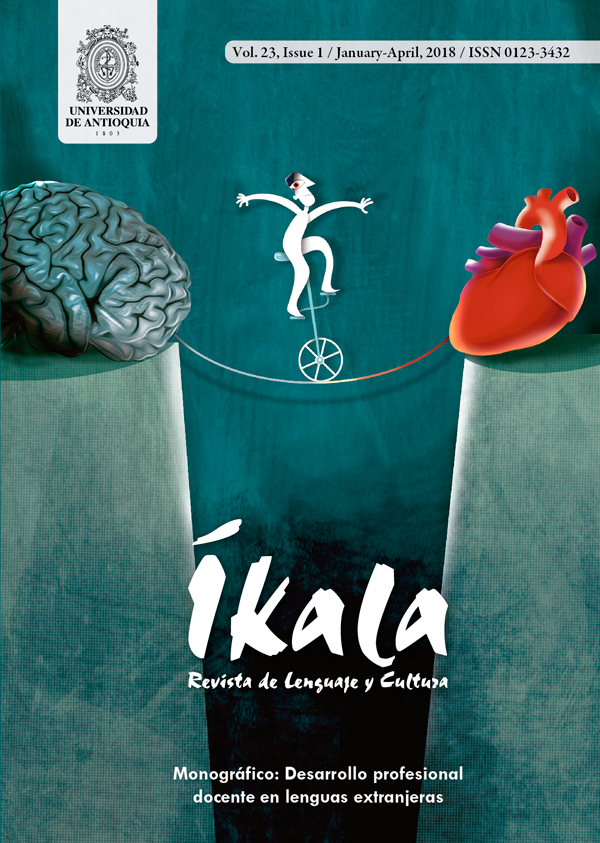Research training in language teacher education: reflections from a mentee and her mentor
DOI:
https://doi.org/10.17533/udea.ikala.v23n01a07Keywords:
foreign language instruction, mentoring, research competencies, research incubators, research training, teacher educationAbstract
A student teacher and her mentor reflect upon their experience of becoming language teachers and researchers within the context of an English teaching program. First, they contextualize the preeminent place that teacher research has gained in teacher education programs in Colombia, primarily because of the demands made by a recent educational reform. Second, the student teacher describes how, through her participation in a research incubator, she actively engaged in research, which allowed her to develop research competencies and to inform her own teaching practicum. Finally, building upon existing theory, the authors conclude that research training galvanized by mentoring has an enormous potential to further teachers’ professional development, bridge existing gaps between educational theory and teaching practice, and strengthen a school-university partnership.
Downloads
References
Abad, J. V., & Alzate, P. A. (2016). Strategies instruction to improve the preparation for English oral exams. PROFILE Issues in Teachers’ Professional Development, 18(1), 129-147. http://dx.doi.org/10.15446/profile.v18n1.49592.
Burns, A. (2011). Action research in the field of second language teaching and learning. In E. Hinkel. (Ed.). Handbook of research in second language teaching and learning (pp 237 - 254). New York, NY: Routledge.
Castro-Garcés, A.Y., & Martínez-Granada, L. (2016). The role of collaborative action research in teachers’ professional development. PROFILE Issues in Teachers’ Professional Development, 18(1), 39-54. http://dx.doi.org/10.15446/profile.v18n1.49148.
Chamot, A. U., & O’Malley, J. M. (1990). Learning strategies in second language acquisition. Cambridge, UK: Cambridge University Press.
Clandinin, D.J., & Connelly, F.M. (1995). Teachers’ professional knowledge landscapes. New York, NY: Teachers College Press.
Cohen, A. D., & Weaver, S. J. (2006). Styles-and-strategies-based instruction: A teachers’ guide. Minneapolis, MN: University of Minnesota.
Decreto 1075 de 2015 (26 de Mayo), Decreto Único Reglamentario del Sector Educación. Retrieved from http://redes.colombiaaprende.edu.co/ntg/men/pdf/decreto_1075_de_2015.pdf
Decreto 2450 de 2015 (17 de Diciembre), por el cual se reglamentan las condiciones de calidad para el otorgamiento y renovación del registro calificado de los programas académicos de licenciatura. Retrieved from http://www.mineducacion.gov.co/1759/articles-357048_recurso_1.pdf
De Faría, L.P., y De Alizo, L.P. (2006). Perfil de competencias del docente en la función de investigador y su relación con la producción intelectual. [Teacher’s competences profile in the role of researcher and its relation to intellectual production] Opción: Revista de Ciencias Humanas y Sociales, 22(50), 159-178.
Edwards, E., & Burns, A. (2016). Language teacher action research: Achieving sustainability. ELT Journal, 70(1), 6-15. doi:10.1093/elt/ccv060
Freire, P. & Macedo, D. (1995). A dialogue: Culture, language, and race. Harvard Educational Review, 65(3), 377-403
Gebhard, J. G. (2009). The Practicum. In Burns, A., & Richards, J. C. (Eds.). The Cambridge Guide to Second Language Teacher Education. (pp. 250-258). Cambridge, UK: Cambridge University Press
Golombek, P.R. (2009). Personal practical Knowledge in L2 teacher education. In Burns, A., & Richards, J. C. (Eds.). The Cambridge Guide to Second Language Teacher Education. (pp. 155-162). Cambridge, UK: Cambridge University Press
González, J. (2008). Semilleros de investigación: Una estrategia formativa. [Research incubators: A formative strategy] Psychologia.
Avances de la disciplina, 2(2), 185-190. Retrieved from http://www.redalyc.org/articulo.oa?id=297225162006
Ley 1450 de 2011. (16 de junio). Por la cual se expide el Plan Nacional de Desarrollo, 2010-2014. Diario Oficial No 48,102. [National Development Plan, 2010-2014]. Retrieved from http://www.secretariasenado.gov.co/senado/basedoc/ley_1450_2011.html
Malderez, A. (2009). Mentoring. In A. Burns & J.C. Richards. (Eds.). The Cambridge Guide to second language teacher education. (pp. 259-268). New York, NY: Cambridge University Press.
Malderez, A., & Bodoczky, C. (1999). Mentor courses: A resource book for trainer-trainers. New York, NY: Cambridge University Press
McKay, S. L. (2009). Second Language Classroom Research. In Burns, A., & Richards, J. C. (Eds.), The Cambridge Guide to Second Language Teacher Education (pp. 281-288). Cambridge: Cambridge University Press
Nunan, D. (1992). Research methods in language learning. New York, NY: Cambridge University Press.
NVivo (Version 10). [Computer Software]. Burlington, MA: QSR International.
Oxford, R. L. (1990). Language learning strategies: What every teacher should know. Boston, MA: Heinle & Heinle.
Oxford, R. L. (2011). Teaching and researching language learning strategies. New York, NY: Routledge.
Puerta, I. C., & Macías, J. A. (2013). Los semilleros de investigación. [Research incubators] Medellín, Colombia: Fundación Universitaria Luis Amigó – Vicerrectoría de Investigaciones.
Resolución 02041 de 2016 (3 de febrero), por la cual se establecen las características específicas de calidad de los programas de Licenciatura. Retrieved from http://www.mineducacion.gov.co/1759/w3-article-356144.html
Torres Soler, L.C. (2005). Para qué los semilleros de investigación. Revista Memorias. Universidad Cooperativa de Colombia, 1-10. Retrieved from http://datateca.unad.edu.co/contenidos/210115/Documento_reconociemiento_Unidad_No_1.pdf
Wenden, A., & Rubin, J. (Eds). (1991). Learner strategies in language learning. New York, NY: Prentice-Hall.
Published
How to Cite
Issue
Section
License
Copyright (c) 2018 Íkala

This work is licensed under a Creative Commons Attribution-NonCommercial-ShareAlike 4.0 International License.












